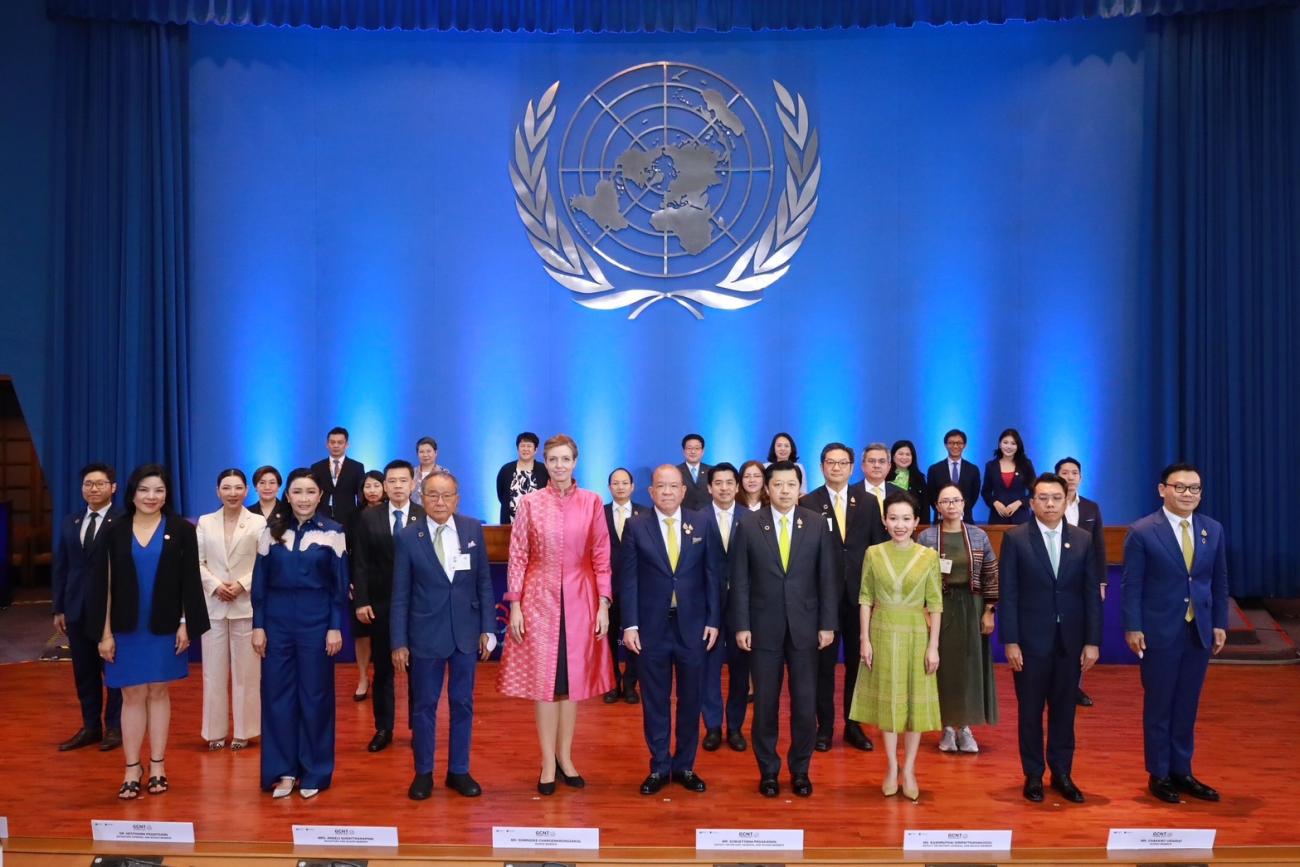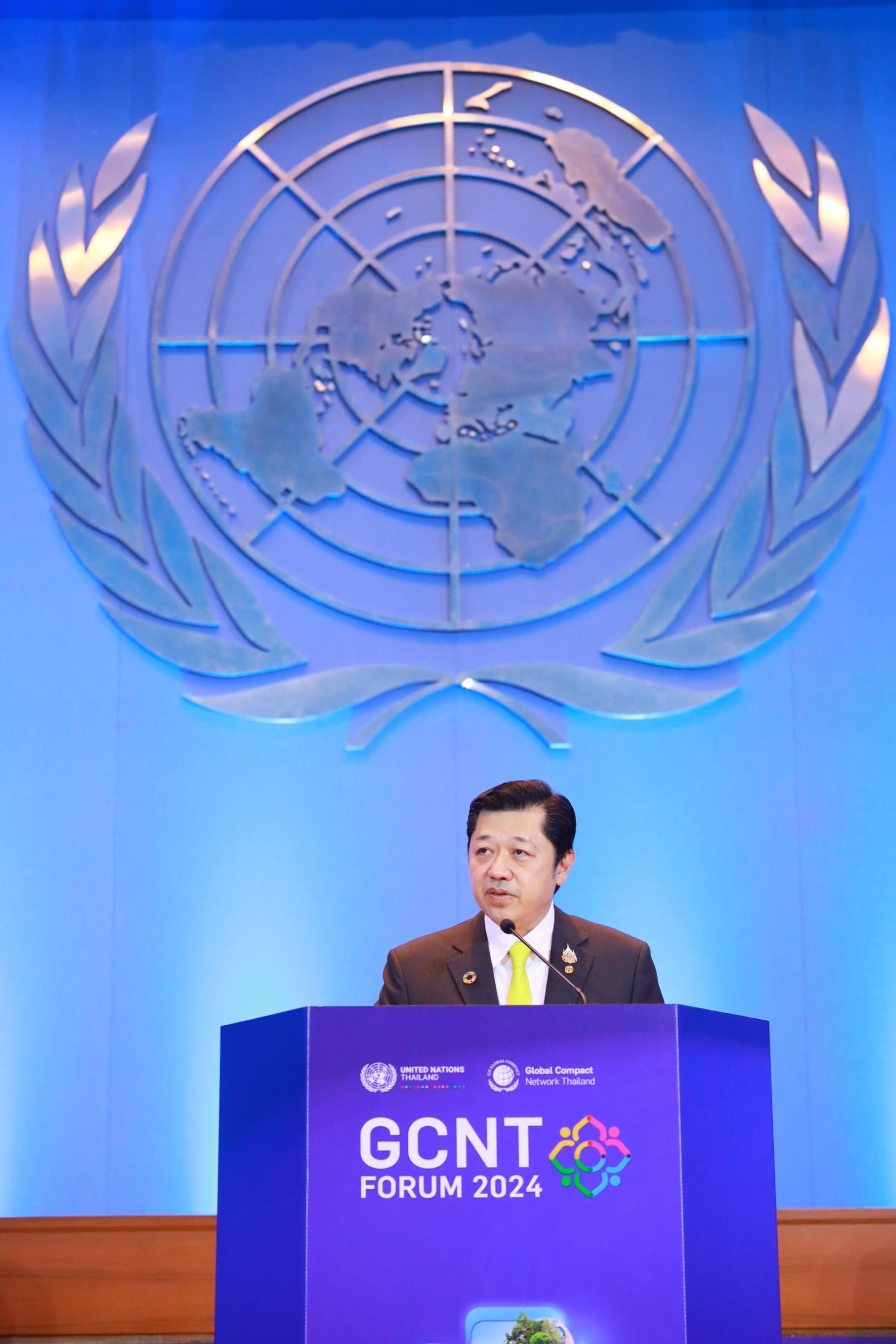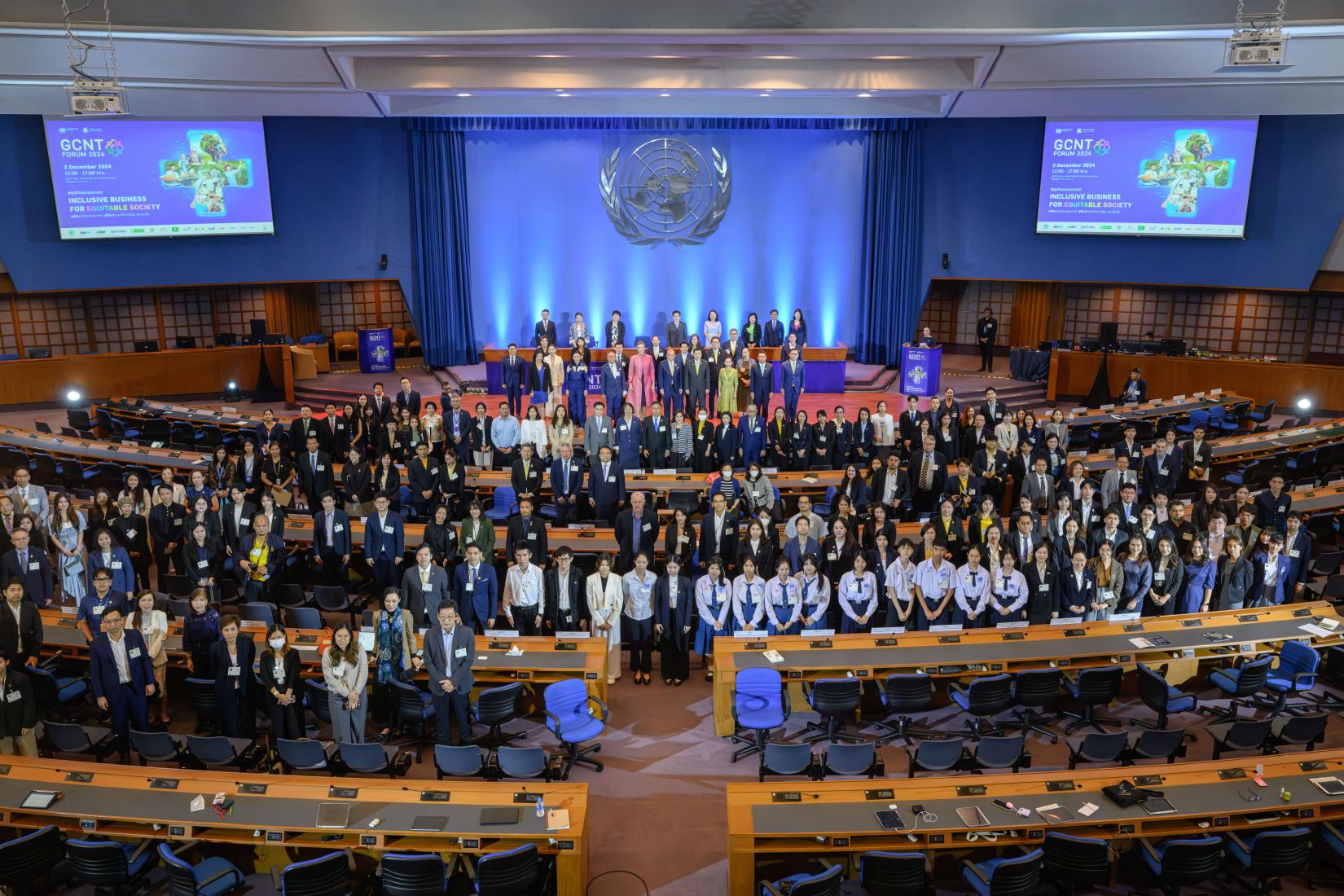Inclusive Business to Transform Future Towards Equitable and Sustainable Society: GCNT Forum 2024

The United Nations in Thailand has joined the Global Compact Country Network in Thailand (GCNT) in convening 141 private sector companies and partners at the GCNT Forum 2024 in Bangkok, as they reaffirmed their collective commitment to unlock growth and positive social impact through sustainable business. The forum urged for greater integration of Micro, Small, and Medium Enterprises (MSMEs) into sustainable supply chains, to accelerate progress on all 17 Sustainable Development Goals (SDGs).
In his keynote remarks, H.E. Pichai Naripthaphan, the Minister of Commerce, noted the importance of inclusive business as a catalyst for change and an equitable society. “The current economic trend in Thailand is progressing well. The government is continuously attracting investment in emerging industries. For example, we must accelerate efforts to position Thailand as a hub for Data Centers and AI, which represent the direction of the future global economy. Simultaneously, the Ministry of Commerce is striving to promote a new generation of SMEs with a focus on inclusive business practices. The government will support sustainability in the economy and trade to ensure that businesses contribute to both societal and environmental growth simultaneously. With the world changing rapidly, we must keep pace with market demands by leveraging our strengths and pushing Thailand's soft power to aid in product marketing. Thai people are highly capable and talented, and all sectors must join forces to ensure success.”
He went on to outline key government policies, including: “1) reducing costs, increasing income, expanding opportunities, managing the cost of living, alleviating the financial burdens of citizens, and creating career opportunities by expanding trade channels, both online and offline, to allow SMEs greater access to domestic and international markets; 2) managing the balance between consumers, farmers, and entrepreneurs; 3) promoting policies to stimulate the local economy; and 4) encouraging entrepreneurs to tap into environmentally conscious markets that prioritize sustainability.”
The Minister added that: “inclusive business is a critical solution for building a sustainable and equitable society. It lays the foundation for driving sustainable development in the future through collaboration across all sectors.”

Mr. Suphachai Chearavanont, President of Global Compact Network Thailand (GCNT) and CEO of Charoen Pokphand Group, delivered a report titled "Forward Faster to 2030 for Inclusive Business." He highlighted the progress made by members in various dimensions, particularly the announcement of sustainability policies and their tangible implementation. This includes continuous risk prevention measures, regular disclosure of operational outcomes, and sustainability training for employees.
Mr. Suphachai noted that members are making efforts to reduce environmental impacts by incorporating clean energy into their operations, producing energy-efficient goods and services, and investing in various sustainability projects. However, he stressed the urgent need for members to take action to scale their sustainability efforts to include business partners and supply chains. This requires setting clear goals, systematically collecting data, and reporting outcomes regularly, ultimately fostering a culture of responsible business competition.
Mr. Suphachai also addressed the "3Ds," which represent key global sustainability challenges and are drivers for achieving the Sustainable Development Goals (SDGs) by 2030. These include: Deglobalization, Decarbonization – Reducing carbon dioxide and greenhouse gas emissions, an area where many countries are still lagging, and Digitalization.
To address these challenges, the UN Global Compact identified five key goals where the private sector can drive meaningful change, forming the basis of the "Forward Faster" initiative: (1) Achieving gender equality, (2) Reducing the impacts of climate change, (3) Setting fair living wages, (4) Revitalizing water resources and Building water resilience, (5) Financing and investing in SDGs.
Mr. Suphachai proposed that Thailand should focus on four new fundamental factors to accelerate sustainable development goals, namely: 1) promoting equal access to quality education - beyond improving teaching standards, businesses should be transformed into learning centers that integrate both professional knowledge and sustainability awareness; 2) expanding access to digital technology - support students, entrepreneurs, startups, and farmers in accessing online data repositories while also developing accessible and creative digital media; 3) increasing access to innovative financial services - leverage fintech and virtual banking to reduce financial inequality, especially for grassroots economies, SMEs, and vulnerable groups; and 4) developing basic insurance systems - Introduce agricultural insurance to turn climate crisis challenges into business opportunities, benefiting both financial institutions and farmers.
“We must act proactively and race against time to ‘shift’ inequality into equity, ensure universal access to the four new fundamental factors, ‘transform’ businesses into future-ready enterprises, and ‘reshape’ the current world into a sustainable one,” Mr. Suphachai concluded.
Commending GCNT members for their commitment towards the SDGs, Ms. Michaela Friberg-Storey, the United Nations Resident Coordinator in Thailand, said “the path to a more equitable future requires collaboration among the private sector, government, civil society, and international organizations to drive holistic societal change.”
“This effort must also prioritize innovation,” she said, outlining 3 key aspects linked to inclusive business practices: 1) achieving a just transition that leaves no one behind; 2) harnessing technology and innovation for equity; and 3) unlocking sustainable financing for transformation.
The UN Resident Coordinator noted that in Thailand, the government has played a fundamental role in establishing regulatory frameworks and implementing investment-stimulating policies. In parallel to this, the private sector has contributed up to 90% of GDP and 90% of jobs in-country, with 75% of all investments in the past year coming from private sources. In addition, SMEs have accounted for 99.6% of all domestic businesses, highlighting the important role the private sector plays in leading the green transition and addressing demands for a greener workforce.
During the event, the concept of inclusive business landscape became the centrepiece of panel discussions. Prominent speakers contributed ideas on accelerating human capital development, as well as on business models for agri-food systems transformations and their linkages to social and economic benefits.

This year’s GCNT Forum brought together more than 400 participants, including UN agencies in Thailand, GCNT member organizations, and sustainability partners. Participants included leading private sector companies, including Charoen Pokphand Group, IRPC Public Company Limited, NR Instant Produce Public Company Limited, PTT Exploration and Production Public Company Limited, Bangchak Corporation Public Company Limited, Charoen Pokphand Foods Public Company Limited, CP All Public Company Limited, Kasikornbank Public Company Limited, SCBX Public Company Limited, Berli Jucker Public Company Limited, PTT Public Company Limited, True Corporation Public Company Limited, United Overseas Bank (UOB) Public Company Limited, L’Oréal (Thailand) Limited, SCG Packaging Public Company Limited, and the Securities and Exchange Commission (SEC). The forum also welcomed 8 youth organizations and representatives of 9 academic institutions who are part of the ‘SDGs Young Creator’ initiative.








